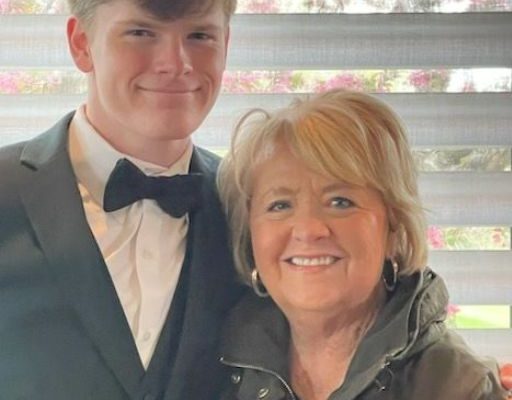When my son first told me he wanted to take his grandmother to prom, I honestly thought he was joking.
“Mom, I want to take Nana,” he said one evening, as casually as if he were asking for dessert.
I chuckled. “That’s sweet, baby, but maybe ask someone your age?”
He shrugged. “I already did. They all said no. Nana’s the only one who always says yes.”
And just like that, he made up his mind.
A few days later, he stood in the hallway wearing his nicest suit—one he’d ironed three times. With a single white rose in one hand and a sign he’d painted himself that read Will you prom with me?, he knelt before his grandmother.
She cried the moment she saw him. Of course, she said yes.
I helped her find a beautiful navy-blue dress, the kind that made her smile in the mirror. We even booked her an appointment at the same salon she used for my wedding. It was one of those rare, genuinely sweet moments that you wish you could bottle forever.
But the sweetness soured quickly.
When my son called the school to ask about bringing his grandmother, their response wasn’t what any of us expected.
“No,” said the secretary, bluntly.
He stayed calm. “I’m not bringing two people. Just my grandma instead of a date.”
“There’s an age limit for guests,” she said. “We can’t allow that.”
He hung up, quiet and heartbroken. I saw the disappointment in his eyes—the tight jaw, the forced blinks as he tried not to cry.
“She’s not just my grandma,” he said softly. “She’s my best friend.”
That night, we sat at the kitchen table in silence. My mom quietly folded the dress back into its garment bag and left it in the spare room. No words—just the quiet of heartbreak.
“I didn’t think they’d say no,” he said.
“You’re trying to be kind,” I told him. “That should matter more than rules.”
I couldn’t sleep that night. I kept thinking about how we raise kids to be thoughtful, bold, and different… only to shut them down when they are.
The next morning, I posted about it. Just a few lines and a photo of my son holding his painted sign.
“I’m proud of my son. He asked his grandma to prom after getting turned down by a few classmates. She was thrilled. But the school said no—because of her age. I wish we celebrated kindness more.”
By lunch, my phone was buzzing non-stop.
The post went viral.
Thousands of comments, shares, messages. People were moved. Some offered to throw their own prom. A retired DJ volunteered to play. A florist offered flowers. A stranger offered to cover a limo rental.
My son blinked at the screen, stunned. “Wait… people care?”
“They do,” I said, smiling. “More than you know.”
Local news picked it up. Then regional. Then a national morning show left a message asking for an interview.
Then, the unexpected happened.
Three days after the post took off, the principal called me.
I braced myself for criticism—but her tone was soft.
“I saw your post,” she said. “And I’ve been thinking.”
There was a long pause before she added, “I was wrong.”
She explained how the school had gotten too caught up in rules and appearances. But the overwhelming response made her realize they’d missed something important. She’d spoken with the school board that morning.
“If your son still wants to bring his grandmother,” she said, “we’d be honored to have her.”
When I told my son, he didn’t say a word. He just ran straight to the spare bedroom.
“Nana!” he shouted. “You’re going to prom!”
She cried. I cried. Even the dog barked, as if he knew.
That week, the entire town seemed to join in. A boutique donated a necklace. The local bakery delivered cupcakes. A photographer offered a free photo session. And the students? They rallied.
The night of the prom came faster than we expected. My son wore a black suit with a navy tie. Nana wore the same shoes she’d saved for my dad’s retirement party—the one he never got to attend. They looked perfect together.
As they entered the gym, the music stopped
But then something magical happened.
Applause. First from the adults. Then from the students. One girl stepped forward and placed a tiara on Nana’s head. “You’re prom royalty tonight,” she whispered.
Their first dance was to an old Elvis song. They moved slowly, a little wobbly, but with the kind of joy that fills a room with light.
And then came another surprise.
One of my son’s classmates—let’s call him Nate—pulled him aside. They talked quietly in the hallway, then returned. Nate walked up to Nana.
“I lost my grandma last year,” he said. “I never really got over it. But seeing you two tonight… it helped. Thank you.”
She hugged him like he was her own.
Funny thing was, Nate had teased my son before. Called him “weird” for being close with his grandma. But that night changed something.
In the weeks that followed, Nate joined my son’s art club. They volunteered together at the senior center. They even started a mural project at a local nursing home. What began as teasing turned into friendship.
Two months later, the school board introduced a new policy. From now on, any student could bring a guest to prom, regardless of age—as long as safety checks cleared. They called it The Harper Clause, after my son.
A year after that, the story was featured in a book about kindness. A teacher in Arizona used it in a lesson. A mom in Italy messaged us, saying her son called his grandma for the first time in months because of the story.
My son still has that painted sign. It’s crumpled now, the corners curled. But he won’t let it go.
“Becase this,” he says, “was the night everything changed.”
He’s a senior now, preparing for college. Wants to study psychology and art therapy. He says he wants to help people feel less alone.
And Nana? She still shows the prom photos to anyone who will look. She keeps that tiara in her room. She tells the story again and again, smiling like it happened yesterday.
What started as a rejected prom invitation turned into a ripple of change.
Because when kindness leads the way, even the rules can change.
So her’s what I learned:
Kindness doesn’t need permission. It doesn’t wait for approval. It simply shows up—with a rose, a dress, and a heart willing to care.
And sometimes, that’s enough to change everything.



